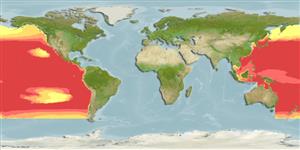Environment: milieu / climate zone / depth range / distribution range
البيئة
بحري; مياه مخلوطة; محيطية (Ref. 51243); نطاق العمق 1 - 550 m (Ref. 58302). Subtropical; 61°N - 52°S, 99°E - 70°W
North Pacific: Gulf of Alaska to southern California and Baja California and from Sakhalin Island in the southern Sea of Okhotsk south to northern Philippines. There are four substantiated records of this subspecies in the southern hemisphere: off Western Australia, southeast Pacific (37°11'S, 114°41'W) and Gulf of Papua (Ref. 10997). The species occurs mainly in the northern Pacific but ventures into New Zealand waters for at least three months during spring and early summer (Ref. 83312).
الحجم / وزن / العمر
Maturity: Lm ? range ? - ? cm
Max length : 300 cm FL ذكر/ مختلط الجنس; (Ref. 9340); common length : 200 cm FL ذكر/ مختلط الجنس; (Ref. 9340); أعلا وزن تم نشرة: 450.0 kg (Ref. 47525); العمر: 15 سنين (Ref. 83312)
Mean number of gill rakers 35.9. First ventrally directed parapophysis on vertebra number 8. Dorsal wall of body cavity has a narrow bulge with lateral concavity and wide lateral trough. Caudal keels dark.
Epipelagic, usually oceanic, but seasonally coming close to shore (Ref. 168). Tolerates ample temperature intervals (Ref. 168). Forms schools by size, sometimes with other scombrids (Ref. 168). Migrates between June and September in a northward direction along the coast of Baja California, Mexico and California (Ref. 168). A voracious predator that feeds on a wide variety of small schooling fishes and squids, also on crabs crabs and to a lesser degree on sessile organisms (Ref. 168). Marketed fresh and frozen.
Collette, B.B., 1995. Scombridae. Atunes, bacoretas, bonitos, caballas, estorninos, melva, etc. p. 1521-1543. In W. Fischer, F. Krupp, W. Schneider, C. Sommer, K.E. Carpenter and V. Niem (eds.) Guia FAO para Identification de Especies para lo Fines de la Pesca. Pacifico Centro-Oriental. 3 Vols. FAO, Rome. (Ref. 9340)
IUCN Red List Status (Ref. 130435)
استخدامات بشرية
مصائد: ذو قيمة تاجرية عالية; الأستزراع المائي: تجاري; لعبة سمكه: نعم
أدوات
تقارير خاصة
Download XML
مصادر علي الأنترنت
Estimates based on models
Preferred temperature (Ref.
123201): 13.9 - 28.1, mean 24.3 °C (based on 983 cells).
Phylogenetic diversity index (Ref.
82804): PD
50 = 0.5039 [Uniqueness, from 0.5 = low to 2.0 = high].
Bayesian length-weight: a=0.01380 (0.00638 - 0.02986), b=3.03 (2.86 - 3.20), in cm total length, based on LWR estimates for this Genus-body shape (Ref.
93245).
مستوى غذائي (Ref.
69278): 4.5 ±0.3 se; based on size and trophs of closest relatives
Generation time: 10.6 ( na - na) years. Estimated as median ln(3)/K based on 2
growth studies.
المرونه (Ref.
120179): وسيط, الحد الزمني الأدني لتضاعف عدد أفراد المجتمع 1.4-4.4 سنة (tm=3-5; tmax=15; K=0.1-0.2).
Prior r = 0.25, 95% CL = 0.17 - 0.38, Based on 3 full stock assessments.
Fishing Vulnerability (Ref.
59153): Very high vulnerability (76 of 100).
Climate Vulnerability (Ref.
125649): Moderate vulnerability (38 of 100).
Nutrients (Ref.
124155): Calcium = 18.3 [10.0, 32.3] mg/100g; Iron = 2.32 [0.96, 5.79] mg/100g; Protein = 24.2 [22.7, 25.5] %; Omega3 = 0.403 [0.246, 0.662] g/100g; Selenium = 42.6 [16.1, 118.0] μg/100g; VitaminA = 21.5 [2.9, 199.3] μg/100g; Zinc = 0.355 [0.211, 0.717] mg/100g (wet weight); based on
nutrient studies.
